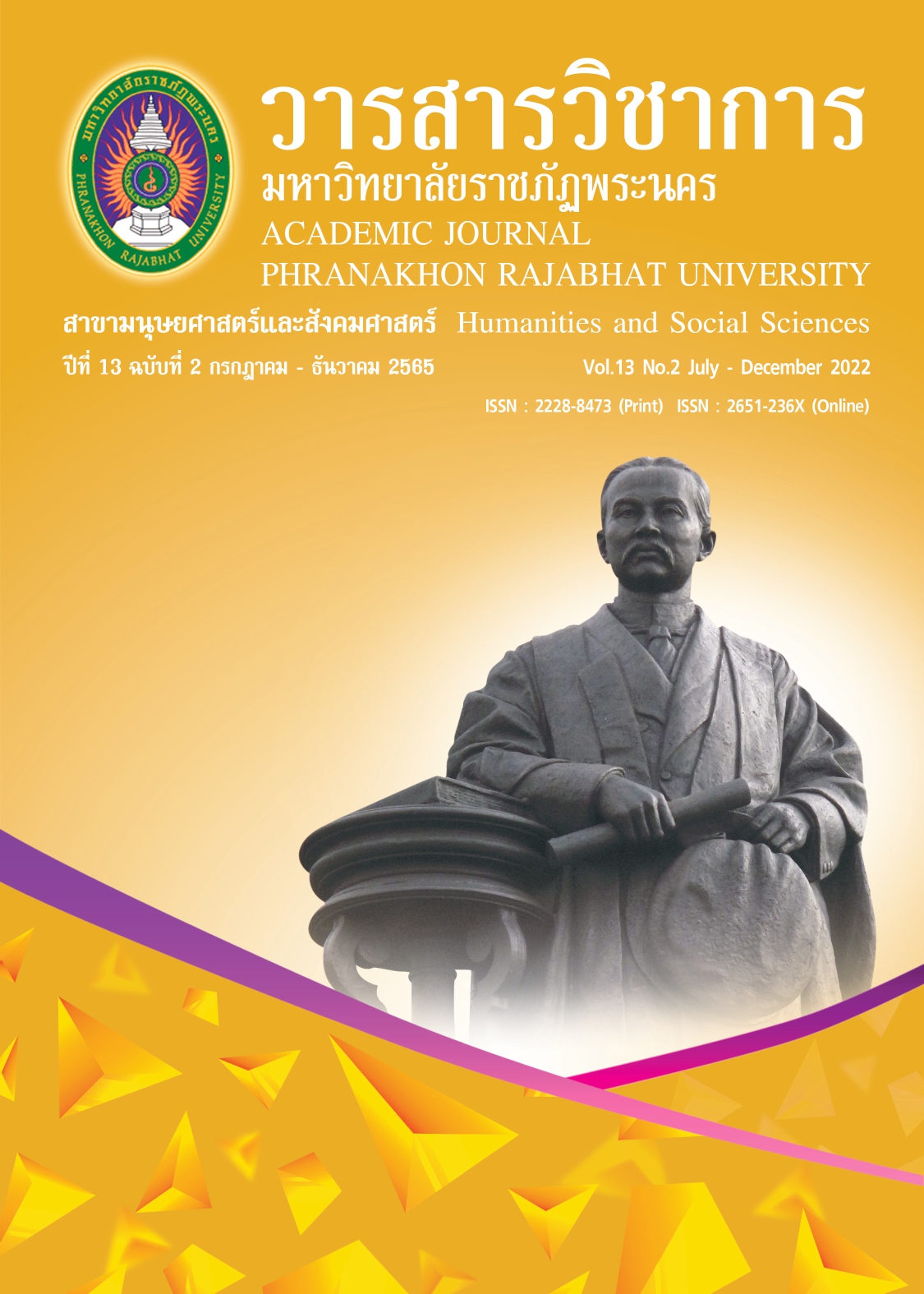FACTORS AFFECTING STRESS LEVEL AND ONLINE LEARNING BEHAVIOR DURING COVID-19 PANDEMIC
Keywords:
Stress, Behavior, Online learning, COVID-19Abstract
The purposes of this research were to study students’ stress level and online learning behavior during the COVID-19 pandemic, and to study factors affecting students’ stress. The research samples consisted of 271 students from Chonburi campus of a private higher education institution, obtained by stratified sampling method as various stratums of faculties. The research instrument was an online questionnaire. The descriptive statistics for data analysis were frequency, percentage, and inferential statistics included Chi-square and Multinomial Logistic Regression.
The research results were found that most of students got a moderate level of stress at 40.6%, followed by mild level of stress at 21.8%. In terms of personal factors affecting stress level, it was found that the students with GPA of 3 or higher, and group that learning online from home got different level of stress from others. Considering from factors of environment and online learning behavior, it was found that online learning location, disturbing noise, anxiety and boredom of online learning affected the students’ stress level at the statistical significance level of .05.
References
AlAteeq, D.A., Aljhani, S., & AlEesa, D. (2020). Perceived stress among students in virtual classrooms during the COVID-19 outbreak in KSA. J Taibah Univ SSci, 15(5), 398-403.
Ali, N.H., & Rosli, R. A. H. M. (2019). Digital Technology: E-content Development Using Apple Technology. Malaysian Journal of Distance Education, 21(1), 83-94.
Anmun, K. (2021). Online Learning, Kids Get Discouraged, Parents Get Stressed, Retrieved from https://www.posttoday.com/politic/columnist/664686 [2022, 7 Apr.] (in Thai)
Bezhovski, Z., & Poorani, S. (2016). The Evolution of E-learning and New Trends. International Institute for Science, Technology and Education, 6(3), 50–57.
Brand Buffet. (2020). After COVID-19, Trend of Thai Consumers’ Behavior Changed Permanently, Affecting 4 Ways of Turning Crisis to Opportunities. Retrieved from https://www.brandbuffet.in.th/2020/04/nielsen-changing-consumer-behavior-in-covid19 [2022, 16 Apr.] (in Thai)
Carver, C.S., Scheier, M.F., & Weintraub, J.K. (1989). Assessing coping strategies: A theoretically based approach. Journal of Personality and Social Psychology, 56, 267–283.
Chaitiang, N. (2016). Factors Related to Stress Management for Students of Kirk University. (Master dissertation). Krirk University, Bangkok. (in Thai)
Department of Disease Control. (2020). Corona Disease 2019 (COVID-19). Retrieved from https://ddc.moph.go.th/viralpneumonia/info.php [2022, 16 Apr.] (in Thai)
Department of Mental Health. (2020). New Normal, New Life Style. Retrieved from https://www.dmh.go.th/news/view.asp?id=2288 [2022, 16 Apr.] (in Thai)
Dharmniti. (2020). How to Adapt and Survive in Life and Business during New Normal Era. Retrieved from https://www.dharmniti.co.th/new-normal [2022, 16 Apr.] (in Thai)
Intarakamhang, U. (2008). Research Synthesis Concerning the Stress and Coping of Thai People. Retrieved from http://bsris.swu.ac.th/upload/115.pdf [2022, 22 Apr.] (in Thai)
Intharawiset, T., Phulketnakhon, T., Charoensa, T., Nak-in, N., Agbi, A. & Reaung-Rong, P. (2019). Technology and Innovation for Instructional in Digital Ages. Veridian E-Journal, Silpakorn University (Humanities, Social Sciences and Arts), 12(6), 478-494. (in Thai)
Jirasophin, L. (2021). The Development of a Massive Open Online Course on GO and Business Thinking Skills Development Subject. Panyapiwat Journal, 13(3), 213–225. (in Thai)
Kiranandana, S. (1999). Theory and Methods of Survey Sampling. (2). Bangkok: Chulalongkorn University Press. (in Thai)
Lazarus, R.S. & Folkman, S. (1984). Stress: Appraisal and Coping. New York: Springer Publishing Company.
Lertsakornsiri, M., Narumitlert, J., & Samutpradit, K. (2021). Factors Effecting on Learning Behaviors with Students’ Online Learning in Saint Louis College from COVID-19 Situations. Journal of Health and Health Management, 7(1), 13-27. (in Thai)
Luemongkol, K. (2021). Stress among Students in Online Classes during the COVID-19 Outbreak in a secondary School, Mueang District, Chaiyaphum Province. Chaiyaphum Medical Journal, 41(2). 11-20. (in Thai)
Maneewongse, N. (2021). Students Behaviors and Factors Achieving Online Teaching with Line Application during COVID-19. Journal of Educational Studies, 15(1). 161-173. (in Thai)
Nopporn, K. (2018). Mental Health, Cumulative Stress, Risk of Admitting Suicide, Retrieved from https://www.samitivejhospitals.com/article/detail/suicide-accumulation-of-stress [2022, 16 Apr.] (in Thai)
Office of National Higher Education Science Research and Innovation Policy Council and Thailand Science Research and Innovation. (2019). Policy and Strategy of Thailand HESI 2020-2027 and Thailand SRI Plan 2020-2022.Retrieved from https://backend.tsri.or.th/files/trf/2/docs/Policy_and_Strategy_of_Thailand_HESI _2563-2570_and_Thailand_SRI_Plan_2563-2565.pdf [2022, 16 Apr.] (in Thai)
Pothimas, N., Meepring, S. & Youjaiyen, M. (2021). The Relationship among Stress related to Online Learning, Resilience, and Coping of Nursing Students during COVID-19 Pandemic. Journal of Health and Nursing Research, 37(3). 142-154. (in Thai)
Rujirungsijaeon, N., Limsuwan, N., Hongsanguansri, S. & Yongyuan, B., (2021). Factors Associated with Stress Levels in Secondary School Students under Bangkok Metropolitan Administration. J Psychiatr Assoc Thailand, 66(1), 53-68. (in Thai)
Sihawong, S., Foongdee, N., Yanarom, N. Noinang, N., Anai, N., Boonchern, T.,… Poryant, T. (2018). Factors Causing to Stress of Nursing Students, Ubon Ratchathani University. HCU Journal, 21(42). 93-106. (in Thai)
Taephant, N. (2020). Reconsider and Restart with Online Learning during COVID-19 Pandemic. Retrieved from https://www.chula.ac.th/news/29739/ [2022, 7 Apr.] (in Thai)
Thai Health Promotion Foundation. (2014). “Stressed Kids” Problem, Suggestions of Proper Solutions. Retrieved from https://www.thaihealth.or.th/Content/23335-stressed kids problem, suggestions of proper solutions.html [2022, 16 Apr.] (in Thai)
Thai Health Promotion Foundation. (2014). What is Stress and How to relax. Retrieved from https://www.thaihealth.or.th/Content/24206-what is stress and how to relax.html [2022, 16 Apr.] (in Thai)
Thitirattanachot, C., Laukongtam, N., Mawong, W., Sriboonruang, T. & Phattarabenjapol, S. (2014). Assessment of Mental Health and Stress of Students at Ubon Ratchathani University. Isan Journal of Pharmaceutical Sciences, 9(Supplement), 66-71. (in Thai)
Wahyu, A. & Simanullang, R.H. (2020). Students Stress Due to Online Learning During the Covid-19 Pandemic. Jurnal Aisyah : Jurnal Ilmu Kesehatan, 5(2), 153-157.
World Health Organization. (2021). Origins of SARS-CoV-2. Retrieved from https://apps.who.int/iris/bitstream/handle/10665/332197/WHO-2019-nCoV-FAQ-Virus_origin-2020.1-eng.pdf [2022, 16 Apr.]
Downloads
Published
How to Cite
Issue
Section
License
Copyright (c) 2022 Academic Journal Phranakhon Rajabhat University

This work is licensed under a Creative Commons Attribution-NonCommercial-NoDerivatives 4.0 International License.
"บทความวิชาการในวารสารฉบับนี้ ถือเป็นความรับผิดชอบของผู้เขียนเท่านั้น"
สงวนลิขสิทธิ์ตามพระราชบัญญัติลิขสิทธิ์




